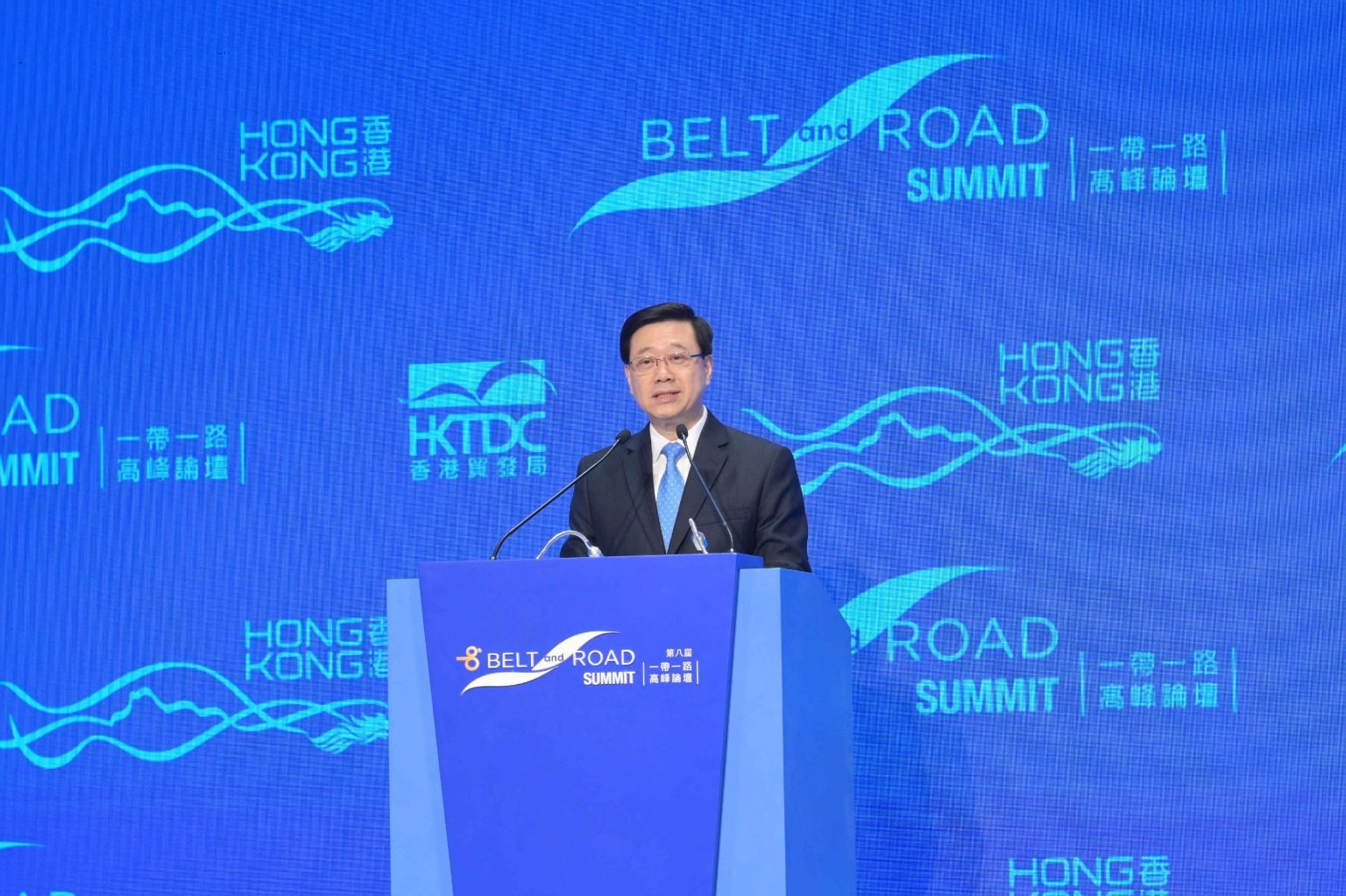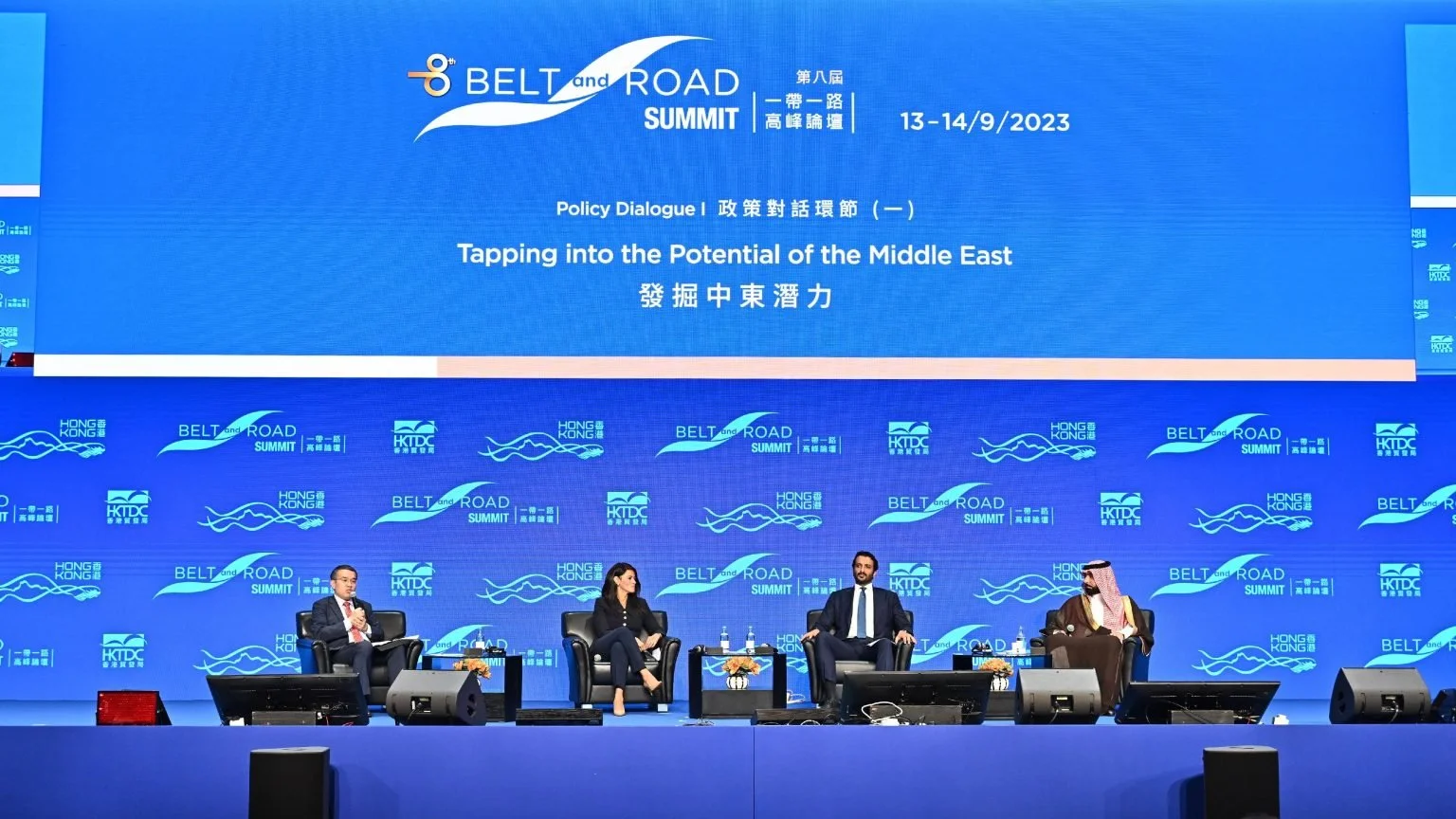“Prospering on a Decade of Collaboration”: Celebrating the 10th Anniversary of Belt and Road Initiative (BRI)
The Chief Executive, The Hon John Lee, GBM, SBS, PDSM, PMSM, speaks at the opening session of the eighth Belt and Road Summit.
Nearly 6,000 attendees and over 100 overseas and mainland delegations witnessed the return of Brand Hong Kong in full force at the 8th Belt & Road Summit held on 13-14 September 2023 at the Hong Kong Convention & Exhibition Centre at Wan Chai. Themed ‘Prospering on a Decade of Collaboration’, the landmark occasion celebrated a decade of China’s groundbreaking ‘Belt & Road Initiative’ resulting in partnerships with over 180 governments and international organisations. The event, held in person for the first time since the COVID-19 pandemic, attracted participation from key dignitaries and political officials, including the Chinese Vice-Premier, The Hon Ding Xuexiang, who addressed the gathering in a pre-recorded keynote speech in which he expressed the Central Government’s full support in helping Hong Kong’s unique status and emphasised its importance in taking the Belt & Road Initiative further ahead.
The Secretary for Financial Services and the Treasury, Mr Christopher Hui (first left), chaired the policy dialogue session titled “Tapping into the Potential of the Middle East” to explore effective ways to tap the Middle East markets, fostering complementarity, mutual benefits and collective development. The Advisor in the General Secretariat of the Council of Ministers, Saudi Arabia, Mr Fahd bin Abdulmohsan Al-Rasheed (first right); the Minister of Economy of the United Arab Emirates, Mr Abdulla Bin Touq Al Marri (second right); and the Minister, Ministry of International Cooperation, Egypt, Dr Rania A Al-Mashat (second left), joined the discussion.
The summit was home to unprecedented gatherings and sharing of opportunities; including panel discussions focusing on key regions like the Middle East such as the one chaired by Hong Kong’s Secretary of Financial Services & the Treasury, The Hon Christopher Hui, GBS, JP, titled ‘Tapping into the Potential of the Middle East’ which included several ministers and important government officials from Egypt, Saudi Arabia and the UAE. Indeed, one of the primary focuses of the event was fostering collaboration between Hong Kong and the Middle East, as was evidenced by the ‘Middle East Forum’ held on the 14th, which offered business intelligence and insight from prominent senior Middle East government officials and corporate leaders and was attended by members of the Hong Kong Ambassadors’ Club.
To call the event successful would be an understatement, as it saw more than 280 investment projects from the Belt and Road region and beyond represented, covering four main areas – energy, natural resources and public utilities; innovation and technology; urban development and transport and logistics infrastructure. Additionally, over 800 one-to-one business matching meetings were arranged for project owners, investors and professional service providers to pave the way for collaboration agreements, all of which resulted in 21 cooperation memorandums of understanding being signed at the event, involving government bodies and companies from Hong Kong, Mainland China and ASEAN countries, such as Malaysia, Vietnam, Indonesia, Thailand, covering renewable construction resources, sustainable energy, R&D, infrastructure, logistics and more. Among the Middle-Eastern nations, MoUs were signed with Bahrain, Saudi Arabia and the UAE to strengthen Hong Kong-Middle East ties.
However, despite its large scale covering a variety of sectors across industries, a lot of promising economies harbouring many innovative ideas and keen workforces failed to gain any significant exposure at the event. Prominent members of the GCC, like Oman, Kuwait and Qatar, attracted little attention from the nearly 6000 attendees over the two-day Summit, with the Qatar Investment Authority (QIA) having to conduct meetings with potential investors and discuss key opportunities within the confines of its embassy instead of at the Summit. It was clear that Hong Kong’s understanding of the Middle East for the time being stretched little beyond the two most prosperous economies among the GCC, i.e. Saudi Arabia and the UAE. Hong Kong’s reputation as a global hub for budding technologies and innovative unicorns of the future also took a sizable hit, with very few local companies working in innovative technology participating in the event.
At a time when most Middle Eastern economies are looking to diversify in line with grandiose plans of development like Saudi Arabia’s ‘Vision 2030’ and the UAE’s ‘Vision 2031’, Hong Kong enterprises offered little of interest with regards to key sectors like SmartCity, New Energy and EVs. It seems to be that while both regions are willing to collaborate, they don’t know quite enough about each other yet to understand what the other is looking for.
This is the gap that the Hong Kong Ambassadors Club attempts to bridge through its vision of deepening ties with strategic regions like the Middle East through intimate and high-level conversations with Hong Kong’s finest, all the while collaborating with the global business community to truly showcase ‘Brand Hong Kong’ in its entire splendour. Having already organised its first-ever delegation earlier this year to the UAE in June, which led to many key strategic agreements and the facilitation of necessary cultural and thought exchange between important business leaders & government officials of the two regions. Click here for more event coverage of The 8th Belt and Road Summit. The Club plans further delegations to Qatar, Kuwait and Bahrain in the coming months to deepen ties across the GCC and introduce ‘Brand Hong Kong’ in its true glory post-pandemic to newer regions.
The Belt & Road Summit, celebrating a decade of global cooperation, was a landmark event, with strategic discussions and key agreements being signed between over 100 nations. However, Hong Kong is to realise its potential as the gateway for key regions into the mainland and Asia. In that case, it will have to start presenting itself as the ‘Global Hub’ of innovation and technology we at the Hong Kong Ambassadors Club believe it to be.


